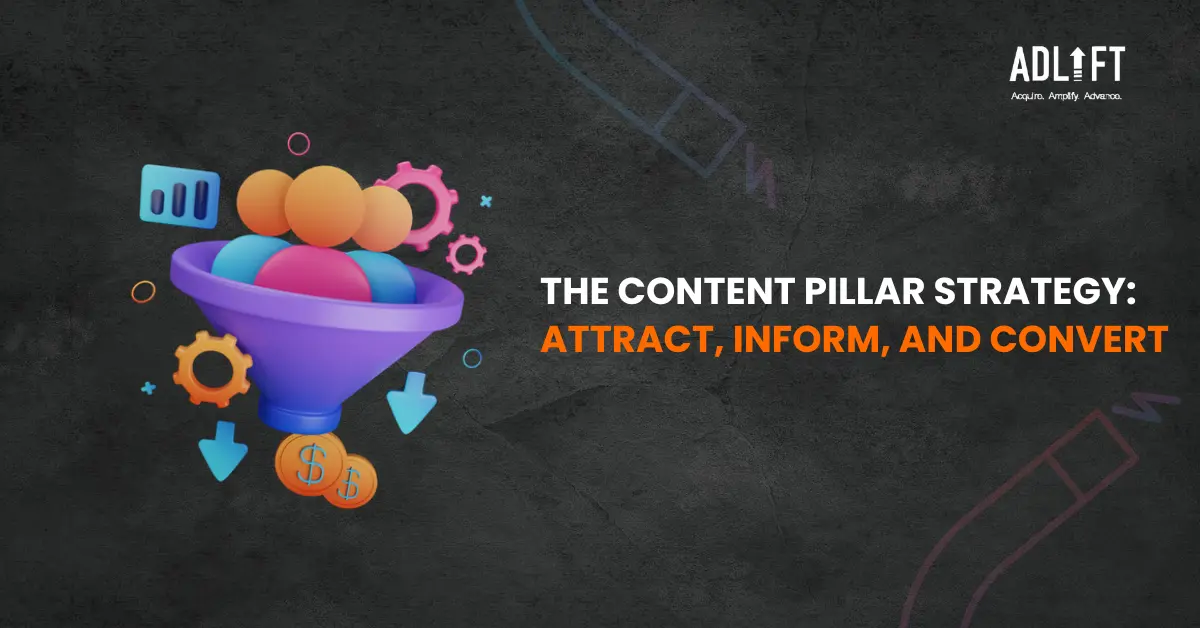Write Right: How Pillar Content Pages Can Revolutionize Your Content Marketing

Content marketing is an important part of digital marketing. However, the way we approach it has changed over time. Nowadays, we need a more strategic and cohesive approach to content creation. Pillar content is the foundation of modern content marketing strategies.
This article will explain pillar content, its key components, benefits, and examples of pillar pages. It will also provide tips on how to create effective pillar content pages.
What are Pillar Content Pages?
When we create a content pillar, we make a detailed, informative piece of content that focuses on a specific topic or theme. This content can then be broken down into smaller sub-topics or sections. Doing this allows us to provide valuable information in a condensed and effective way. By covering all the necessary sub-topics that fall under the primary theme, we can ensure that we engage our audience with the right content on the most appropriate platform. If you’re wondering how to do this, don’t worry- we will keep it simple for you.
Structure of Pillar Pages and Topic Clusters
When creating a pillar page and topic clusters, it’s helpful to think of it as a table of contents or an A-Z guide. At the top, you’ll find the general topic, followed by related subtopics that link to your cluster pages.
For instance, on the pillar page, you can include subtopics like heuristics, cognitive biases, social proof, user-generated content, and consumer behavior models. Each of these subtopics will link to relevant topic cluster pages that contain even more information.
The topic clusters and pillar pages will provide visitors with a comprehensive overview of the topic. If visitors want to learn more about a specific subtopic, they can click through to the cluster pages linked in each section.
How are Pillar Pages Beneficial for SEO and Your Business?
Having a pillar page as part of your SEO strategy is important because it can help you organize your content better. When your content is better organized, it makes it easier for users and search engines to find what they’re looking for. Here are the top ways in which an effective pillar content strategy assists in SEO:
- Comprehensive Coverage: When creating content, it’s important to cover the main topic in detail. This helps show that you’re knowledgeable and an authority in your field. Search engines like authoritative content and are more likely to rank it higher in search results.
- Keyword Targeting: To improve your content’s visibility in search engine results pages, you can use target keywords and connected search terms related to your business niche. Conducting keyword research and strategically including them in your pillar page SEO strategy can help.
- Internal Linking Structure: The pillar content page can act as a central hub that connects to related sub-topics or cluster content within your website. This makes it easier for pillar pages SEO to crawl and index your content more effectively. Organizing your content using a topic cluster model and establishing a strong internal linking structure helps create a logical and interconnected web of pillar and cluster content.
- Enhanced User Experience: When users find your content helpful, engaging, and easy to navigate, they are more likely to spend more time on your website. This can improve your website’s overall user engagement metrics and reduce bounce rates, which can enhance your website’s SEO performance.
- Backlink Generation: Well-crafted content tends to attract backlinks from other websites, blogs, or industry publications. Backlinks indicate to search engines that your content is valuable and authoritative. High-quality backlinks can immensely strengthen your website’s domain authority and improve its overall SEO performance.
Crafting Your Pillar Content Page
We now understand what pillar content is and how they are important to enjoy a better search ranking with the change in the search engine algorithm. But how to craft your own pillar page? Here are some considerations you should keep in mind while crafting your pillar page:
- Topic Selection: Identify a relevant, broad theme that aligns with your audience’s interests and your business objectives.
- Keyword Research: Conduct thorough keyword research to optimize your content for SEO and target the right audience.
- Headline Hero: Create a compelling headline that grabs attention, clearly conveys the topic, and entices users to click.
- Structured Organization: Organize information logically using clear headings, subheadings, and bullet points for easy navigation.
- Engaging Prose: Write clearly, concisely, and engagingly, incorporating storytelling elements and a conversational tone.
- Visual Storytelling: Include high-quality images, infographics, and videos to break up text and enhance understanding.
- Cluster Connection: Seamlessly link your pillar page to related, in-depth articles on specific subtopics within the main theme.
- Promotional Prowess: Share your pillar page on social media, email newsletters, and relevant online communities to maximize reach and engagement.
Engaging Your Audience Pillar Pages
Pillar pages are considered one of the most effective digital marketing strategies, and creating an ideal pillar content strategy that builds relationships with your customers and readers is key. To do this, it’s important to stay up-to-date with their changing needs. Your content should generate awareness, which is the first step towards conversion. So, make sure every piece of content you write or gather is worth the time spent on it. If you need help getting started, then the experts at AdLift are here to help. Get in touch with us, and we’ll get you started right away!
